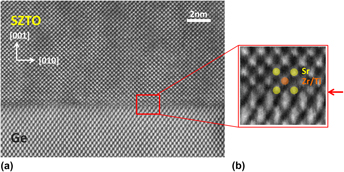Crossref Citations
This article has been cited by the following publications. This list is generated based on data provided by
Crossref.
Lim, Z. H.
Ahmadi-Majlan, K.
Grimley, E. D.
Du, Y.
Bowden, M.
Moghadam, R.
LeBeau, J. M.
Chambers, S. A.
and
Ngai, J. H.
2017.
Structural and electrical properties of single crystalline SrZrO3 epitaxially grown on Ge (001).
Journal of Applied Physics,
Vol. 122,
Issue. 8,
Liu, Xiaohui
Tsymbal, Evgeny Y.
and
Rabe, Karin M.
2018.
Polarization-controlled modulation doping of a ferroelectric from first principles.
Physical Review B,
Vol. 97,
Issue. 9,
Hu, Shen
Ji, Li
Chen, Pei-Yu
Edmondson, Bryce I.
Chang, Heng-Lu
Posadas, Agham
Wu, Hsin Wei
Yu, Edward T.
Smith, David J.
Demkov, Alexander A.
and
Ekerdt, John G.
2018.
Crystalline SrZrO3 deposition on Ge (001) by atomic layer deposition for high-k dielectric applications.
Journal of Applied Physics,
Vol. 124,
Issue. 4,
Hu, Shen
and
Ekerdt, John G.
2018.
Preventing carbon contamination of Ge (001) during atomic layer deposition with a barium-based Zintl layer.
Journal of Vacuum Science & Technology A: Vacuum, Surfaces, and Films,
Vol. 36,
Issue. 4,
Du, Y.
Sushko, P. V.
Spurgeon, S. R.
Bowden, M. E.
Ablett, J. M.
Lee, T.-L.
Quackenbush, N. F.
Woicik, J. C.
and
Chambers, S. A.
2018.
Layer-resolved band bending at the
n−SrTiO3(001)/p−Ge(001)
interface.
Physical Review Materials,
Vol. 2,
Issue. 9,
Chen, Tongjie
Ahmadi-Majlan, Kamyar
Lim, Zheng Hui
Zhang, Zhan
Ngai, Joseph H.
Kemper, Alexander F.
and
Kumah, Divine P.
2018.
Interfacial structure of SrZrxTi1−xO3 films on Ge.
Applied Physics Letters,
Vol. 113,
Issue. 20,
Lim, Z. H.
Quackenbush, N. F.
Penn, A. N.
Chrysler, M.
Bowden, M.
Zhu, Z.
Ablett, J. M.
Lee, T.-L.
LeBeau, J. M.
Woicik, J. C.
Sushko, P. V.
Chambers, S. A.
and
Ngai, J. H.
2019.
Charge Transfer and Built-in Electric Fields between a Crystalline Oxide and Silicon.
Physical Review Letters,
Vol. 123,
Issue. 2,
Kumah, Divine P.
Ngai, Joseph H.
and
Kornblum, Lior
2020.
Epitaxial Oxides on Semiconductors: From Fundamentals to New Devices.
Advanced Functional Materials,
Vol. 30,
Issue. 18,
Chrysler, M.
Gabel, J.
Lee, T.-L.
Penn, A. N.
Matthews, B. E.
Kepaptsoglou, D. M.
Ramasse, Q. M.
Paudel, J. R.
Sah, R. K.
Grassi, J. D.
Zhu, Z.
Gray, A. X.
LeBeau, J. M.
Spurgeon, S. R.
Chambers, S. A.
Sushko, P. V.
and
Ngai, J. H.
2021.
Tuning band alignment at a semiconductor-crystalline oxide heterojunction via electrostatic modulation of the interfacial dipole.
Physical Review Materials,
Vol. 5,
Issue. 10,
Wang, Hui-Qiong
Xu, Jiayi
Lin, Xiaoyuan
Li, Yaping
Kang, Junyong
and
Zheng, Jin-Cheng
2021.
Determination of the embedded electronic states at nanoscale interface via surface-sensitive photoemission spectroscopy.
Light: Science & Applications,
Vol. 10,
Issue. 1,
Vaz, C. A. F.
Shin, Y. J.
Bibes, M.
Rabe, K. M.
Walker, F. J.
and
Ahn, C. H.
2021.
Epitaxial ferroelectric interfacial devices.
Applied Physics Reviews,
Vol. 8,
Issue. 4,
Prakash, Divya J.
Chen, Yajin
Debasu, Mengistie L.
Savage, Donald E.
Tangpatjaroen, Chaiyapat
Deneke, Christoph
Malachias, Angelo
Alfieri, Adam D.
Elleuch, Omar
Lekhal, Kaddour
Szlufarska, Izabela
Evans, Paul G.
and
Cavallo, Francesca
2022.
Reconfiguration of Amorphous Complex Oxides: A Route to a Broad Range of Assembly Phenomena, Hybrid Materials, and Novel Functionalities.
Small,
Vol. 18,
Issue. 1,
Chambers, S. A.
Chrysler, M.
Ngai, J. H.
Lee, T.-L.
Gabel, J.
Matthews, B. E.
Spurgeon, S. R.
Bowden, M. E.
Zhu, Z.
and
Sushko, P. V.
2022.
Mapping hidden space-charge distributions across crystalline metal oxide/group IV semiconductor interfaces.
Physical Review Materials,
Vol. 6,
Issue. 1,
Averyanov, Dmitry V.
Sokolov, Ivan S.
Taldenkov, Alexander N.
Kondratev, Oleg A.
Yakunin, Sergey N.
Parfenov, Oleg E.
Tokmachev, Andrey M.
and
Storchak, Vyacheslav G.
2024.
Breakdown of rotational invariance in cube-on-cube epitaxy of rock-salt oxides on Si and Ge.
Surfaces and Interfaces,
Vol. 45,
Issue. ,
p.
103919.
